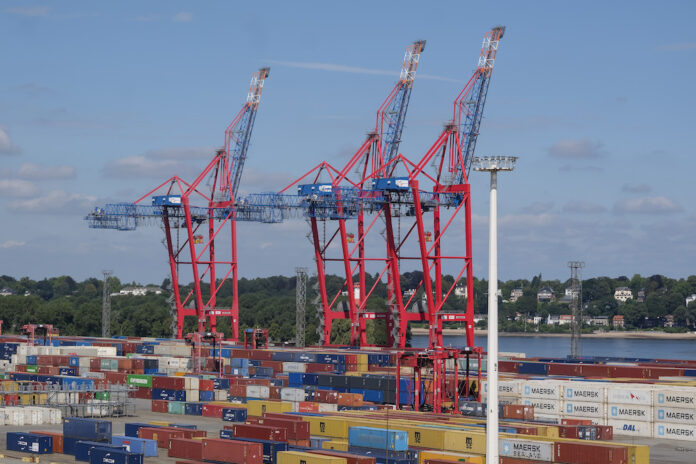Eurogate gets its own core network on-site within Telekom’s network
Deutsche Telekom will deploy three 5G campus networks in the ports of Hamburg, Bremerhaven and Wilhelmshaven for long-serving shipping and container customer Eurogate.
Based on the telco’s “Campus network L” service – which offers its own private mobile network with assured network resources on-premises – allowing Eurogate to use its own 5G (3.7-3.8GHz) industrial frequencies, to run critical data traffic. At the same time, it utilises Telekom’s public mobile network for things like the closer networking of handling equipment with control and process control systems.
Other than Telekom’s public 3.6GHz spectrum, these 5G frequencies were specifically made available by the German Federal Network Agency for industrial applications.
The project has now been launched at a kick-off event at the Port of Hamburg and includes some government funding. The telco will equip port terminals in Hamburg, Bremerhaven and Wilhelmshaven with local 5G networks by spring 2024.
Telekom launched two flavours of its campus networks in 2019, the other being Campus network M which is targeted at German SMEs. In both campus network solutions, the mobile radio antennas deliver full coverage of the private network on the company premises. At the same time, they also make the public mobile network available on campus with the same signal strength. The telco calls this “dual slice”.
Telekom launched the 5G versions in April this year. The telco typically uses both Ericsson and Mavenir for its campus networks, with the former being most used in Germany.
Data stays on-site
Once installed, Eurogate will have two 5G frequency bands and a total of around 190MHz of bandwidth at its disposal. The telco said it was using a new architecture for the “Campus network L” service which will combine a central 5G core network within the Telekom network with a local user gateway for the customer – enabling control and user plane separation.
This means that the 5G campus network is managed centrally by Telekom, but the customer’s own data remains exclusively on-site on its own campus. The local user gateway also ensures low latencies as data goes directly from devices to Eurogate’s IT network via the private network.
Eurogate can also utilise exclusive SIM cards with unlimited data flat rates for networked devices, at speeds up to 1.5Gbps on downloads. The company can manage these SIMs via a self-service portal. All local network components, including the user gateway, are also redundant.
“The 5G coverage of Eurogate’s container terminals is one of our largest campus network projects to date,” said Telekom managing director in the Business Customers division Hagen Rickmann. “In addition to high-performance 5G connectivity and exclusive bandwidth, the network architecture of the three campus networks will offer a particularly high level of control over critical data traffic on the terminal site in the future.”
“Deutsche Telekom’s 5G Campus networks will provide us with the best conditions for further automating our processes and testing innovative logistics solutions based on 5G,” said Eurogate chairman Michael Blach.
785 football pitches
Telekom’s campus networks will cover a total area of 5.6m sqm at the three container terminals, roughly around 785 football pitches – even more than needed to host FIFA’s ridiculously expanded 2026 World Cup.
In addition to expanding the existing mobile network, Telekom is utilising existing light poles as supports for three additional 5G radio sites at each of the terminal sites in Bremerhaven (2.9m sqm) and Hamburg (1.4m sqm) and two in Wilhelmshaven (1.3m sqm). The deployment of the three 5G campus networks will be completed by spring 2024.
Eurogate has used T-Systems as its outsourcing partner since 2006. In 2016, the telco implemented a joint project with Huawei to instal a container-housed data centre for Eurogate in in Limassol, Cyprus.
Port-as-a-service funding
The German Government wants to make its seaports digital, so the Federal Ministry of Digital Affairs and Transport (BMDV) has put money towards the port-as-a-service project to create real test spaces for Logistics 4.0 innovations. The Telekom part of Eurogate’s project is getting €2.9m and is being supported by TÜV Rheinland as the project sponsor of the funding guideline.


